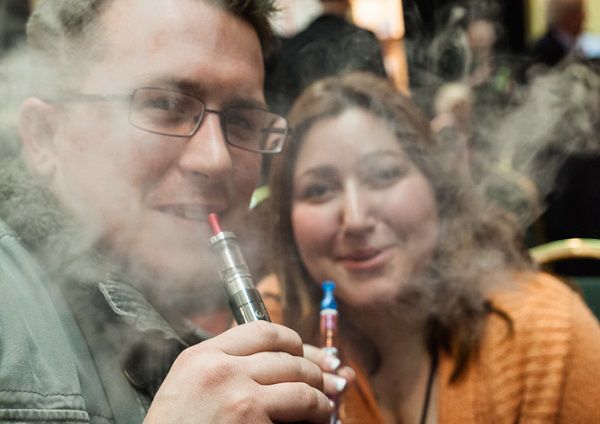
A new longitudinal study published in Addictive Behaviors has provided evidence that “dual users” of both e-cigarettes and tobacco cigs generally reduce the number of cigarettes they smoke or quit entirely, as well as offering an insight into the behavior of us now-vaping ex-smokers. Generally speaking, the results are pretty positive, and the study helps to quash some of the claims coming from the more fundamentalist anti-vapers that e-cigarettes facilitate dual use and could lead to an increase in cigarette or nicotine consumption. However, problems with the method of sample selection mean that the results might not generalize to the average e-cigarette user.
Read our interview with Professor Jean-Francois Etter, the lead author of this study.
Summary
- Researchers used interested participants from a previous study for this research.
- Three out of every four respondents was a daily vaper.
- Among those who vaped daily, the majority were still doing so (without a decrease in puffs per day) after one year. However, only 6 percent of vaping ex-smokers relapsed over the study period.
- No ex-smokers who used an e-cig went back to daily smoking.
- For new vapers (using e-cigs for less than one month), 81 percent were still vaping after a year.
- 22 percent of the dual users (smoking and vaping) at the beginning of the study had become abstinent from smoking after one month, and this increased to 46 percent after a year.
- The research is good news for vapers, but the sample is unlikely to be representative of the average e-cig user.
What They Did
The aim of this survey was to investigate the behavior of vapers over the long term; to see how their use of e-cigarettes changed and for any who were dual users, how their cigarette consumption changed. The researchers had already conducted surveys on e-cigarette users aged over 18, and they obtained the sample for this research on dedicated websites and forums, as well as the site hosting the survey, stop-tabac.ch. As part of the original study, they canvassed for participants who would be interested in a follow-up. Between August 2011 and January 2013, they set about obtaining email addresses for these interested participants, and collected data for the new study.
Out of the 1329 interested participants from the original research, 773 people provided an email address, and a month from the date of the original research, 477 (62 percent) of those responded. They were contacted again after a year, at which point 367 responded (47 percent). Those who answered the follow-ups were primarily from the U.S., France, the U.K. and Switzerland, and in addition they were more likely to vape daily, no longer smoke and be more motivated to quit. In many other ways, such as the reasons they started using e-cigs, vaping habits (amount per day and duration of use), education or the number of cigarettes smoked per day, there was no difference between the respondents and non-respondents.
The two follow-up surveys asked questions about current e-cigarette use (including puffs per day), current smoking (including number of cigarettes per day), whether they’d used tobacco in the previous week (if not, they were classed as currently abstinent from smoking) and for former smokers, how long they’d been abstinent. This enabled the researchers to track the smoking and vaping habits of the survey respondents over the course of a year.
What They Found
The vast majority of the participants vaped every day, with only 17 percent having never used an e-cig, 5 percent who’d used them in the past and 2 percent who used them occasionally. Of the entire sample, just over 3 out of every 4 participants were a daily vapers. eGos and ProVaris were popular, and the current vapers had been using e-cigs for around three months on average.
A month on from the baseline survey, 98 percent of the e-cig users were still vaping daily. This figure dropped at the one year follow up, but only to 89 percent. All of these participants were vaping around the same amount per day (200 puffs) at the final follow-up. This seems to indicate that those who vape usually continue to do so for at least a year, but it is potentially more reflective of the method used to obtain the sample. If the sample of e-cigarette users is limited to those new to vaping (less than one month of use), 93 percent are still vaping after a month and 81 percent after a year.
Out of the e-cigarette users who were former smokers, only 6 percent relapsed to tobacco use, and this figure stayed consistent at the one month and one year follow ups. For the more recent quitters (and therefore newer vapers), after one month 8 percent had smoked occasionally over the previous 7 days, but at the one-year follow up this dropped to 5 percent. However, the researchers note that none of them went back to daily smoking.
The “dual users” – who smoked cigarettes either daily or occasionally in addition to using e-cigarettes – had reduced the amount of cigarettes smoked by an average of 10.5 per day after they started vaping, according to the baseline survey. At the one month follow-up, this had decreased by another 5.3 cigarettes per day, but then it crept back up to the baseline level over the year. However, out of the dual users, 22 percent were completely abstinent from smoking at the one month follow-up and 46 percent at the one year follow up.
What Does it Mean?
The research does have some limitations, but the most important insight it gives is into the dual users. There is speculation that dual use of e-cigs and tobacco cigarettes is something to be wary of, that it may have negative impacts on health. The dual users in the research actually tended to decrease their cigarette consumption (compared to when they didn’t vape), and it didn’t have a negative impact on their smoking behavior – in fact, almost half of them had quit by the end of the study period. There is still no evidence that dual use of e-cigarettes and tobacco cigarettes is anything but a positive move which reduces cigarette consumption. While it’s undoubtedly better if you become entirely abstinent, a reduction in smoking is a good result non-the-less.
The researchers note, “While we are unable to establish causal links between vaping and smoking behavior from these observational data, our findings are consistent with the hypotheses that e-cigarettes provide an alternative to smoking; help former smokers avoid relapse; and help current smokers stop smoking.”
However, since the participants were recruited using e-cigarette websites and forums, the sample probably isn’t representative of vapers on the whole. It stands to reason that you’re more likely to find dedicated vapers on forums and e-cig websites than those strictly using e-cigs as a method to reduce and ultimately eliminate their nicotine consumption. This may be why such a large proportion of the vapers in this sample continued for over a year, and the fact that the “newer” vapers were more likely to stop is also in agreement with this explanation.
In addition to being the sort of vapers willing to participate in one study, these are a further sub-set who are willing to answer follow-up questions. The fact that these people were found to be more motivated to quit smoking and were more likely to be daily vapers than non-respondents shows how they are perhaps more enthusiastic and dedicated than many ex-smokers. The researchers do note that their usage habits were in line with those found in other studies, however, so the vaping habits of the participants do appear to be representative.
One of the major problems with surveys is that they often rely on self-reporting, and people lie. Technically, the measure of abstinence in the study wasn’t avoiding cigarettes altogether for the past week; it was merely a willingness to say you haven’t smoked. This isn’t to say that the results aren’t reliable, but it’s pretty much impossible to draw any weighty conclusions about the effectiveness of e-cigs for smoking abstinence, or anything of the sort.
An issue that may arise with the interpretation of the results is the fact that most of the e-cigarette users were still vaping after a year. Some may claim that e-cigarettes merely allow addiction to continue, but this is based on the implicit assumption that these people would have somehow magically been able to beat nicotine addiction otherwise. Yes, 89 percent of this sample was still vaping after a year, but the fact that they were likely to be more dedicated and enthusiastic users goes some way to explaining this.
Even if this was a representative group, this is precisely the issue e-cigs were designed to address. People want to quit smoking because of the abundant dangers, but because they’re addicted to nicotine they are unable to. E-cigs give these people another option, and if the abundant dangers are removed, is a continuing nicotine addiction really any worse than a caffeine addiction?
Prof. Etter echoed this point:
Even if there are long-term vapers, this is not a problem, as long as they quit smoking. The problem is combusted tobacco, not nicotine. At the dosage used by vapers or users of nicotine gums or patches, nicotine is not toxic. Long term vaping is not a public health problem; not any more than long term use of nicotine gums.
Conclusion
Even with the above limitations, this is more good news for e-cigarettes. It does appear as though many e-cigarette users continue to vape, but one of the key tenets of the anti-vaping argument is pretty well-addressed in this paper. It seems that dual users often quit entirely, and for ex-smokers who are vaping, the rate of relapse appears to be very low indeed. Although a bigger study – preferably some clinical trials – would be needed to confirm the main findings, this is yet another piece of data which supports the masses of anecdotal evidence that e-cigarettes really do work.
Read the full interview with Prof. Etter regarding the research. Additionally, Prof. Etter is currently looking for participants for a new survey regarding the long-term behavior of vapers, and if you’re interested in getting involved, you can do so here. The only requirements are that you’ve vaped before and you’re over 18, so if you’re eligible and can spare 10 minutes, please fill out the questionnaire!
Similar e-cig studies:
- Study Reveals E-Cigarettes May Not Be a Gateway to Smoking
- French Study Finds that E-Cigs Are “Potentially Carcinogenic”
- Study Shows that 74% of Ex-Smokers Quit with E-Cigarettes
- Study: Most E-Cig Vapor Poses No Risk to Heart Cells
- More Ex-Smokers Report Using Tank System in Recent Study
Photo credit: r0ss/Flickr

